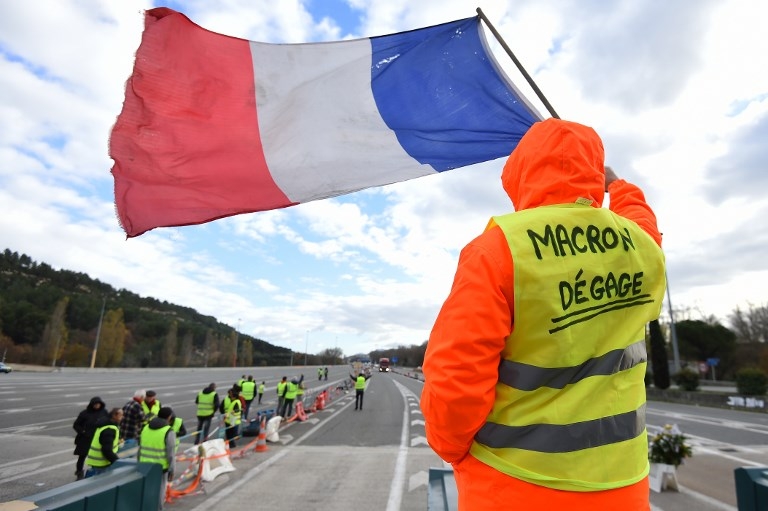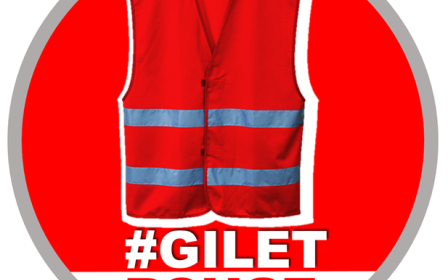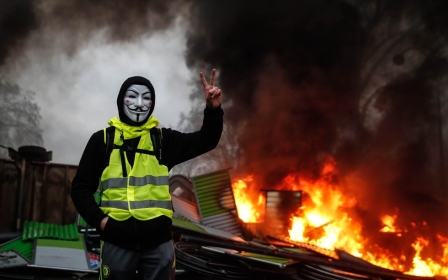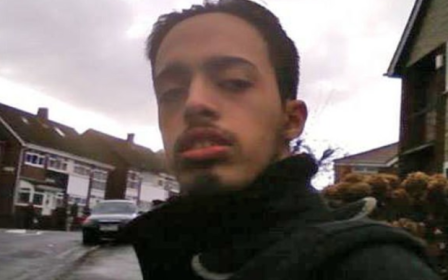Egypt restricts yellow-vest sales ahead of anniversary of revolution

Egyptian authorities have limited the sale of reflective yellow vests because of fears they could be used in protests ahead of the anniversary of the 25 January revolution that toppled former president Hosni Mubarak in 2011.
Security officials have warned retailers in Cairo and Alexandria that they should not sell bulk quantities of yellow vests, which have become a symbol of anti-austerity protests in France, to walk-in customers, according to reports on Tuesday by Al-Jazeera and the Associated Press news agency.
Sales to wholesale businesses would require a police permit, officials told AP, with the restrictions set to remain in place until the end of January.
Owners of industrial safety equipment shops in Cairo were also asked by police officials to report any individuals seeking to buy large numbers of vests, Al Jazeera reported.
The move highlights Egypt’s anxiety over possible anti-government protests on the eighth anniversary of the 2011 "Arab Spring" revolution.
The revolution led to the adoption of a new constitution and democratic elections in which the Muslim Brotherhood-backed Mohamed Morsi was elected president.
But Morsi was overthrown in a military coup in 2013 which brought President Abdel Fattah al-Sisi, then the head of Egypt's armed forces, to power.
Every year, although a virtual ban on protests remains in place, Egypt deploys army and police forces on the streets to prevent any popular marches in commemoration of the 25 January anniversary.
Egyptian media, largely a mouthpiece of government since the 2013 coup, have dedicated significant airtime to warn against the damaging consequences of the French yellow vests movement.
French President Emmanuel Macron has pledged to raise the minimum wage and introduce tax cuts in response to the protests.
Amr Adeeb, a popular pro-Sisi TV host, took aim at the French protests as “indefensible”, and declared his opposition to the movement.
"Some people have been trying to blackmail us by saying that people who eat croissants are braver than the people who eat falafel. But I will not be blackmailed, I am sorry I will not do like them," he said.
He said he supports the government of France against the protesters, whose movement has only “destroyed tourism” and “turned the country upside-down”.
The privately owned daily Al-Masry Al-Youm has published several reports quoting “Islamist experts” weighing in on the yellow vests debate, suggesting that the Muslim Brotherhood is behind the movement.
Nabil Naim, an analyst quoted by the newspaper, said the Brotherhood is “undoubtedly” taking part in the protests, and that the way the protests were organised “shows that the group is behind them".
“We must not forget that there are Algerians, Tunisians and Moroccans affiliated to the Muslim Brotherhood living in the suburbs of Paris, and certainly they participated in the violent events,” he said.
Since 2013, Sisi has led a sweeping crackdown on both Morsi’s supporters and secular pro-democracy activists. Rights groups have documented the detention of at least 60,000 political prisoners since Sisi assumed office, in a wave of repression that Human Rights Watch has described as "the worst human rights crisis in the country in decades".
Sisi is currently serving his second and last term in office but the Egyptian parliament will reportedly discuss next spring a constitutional amendment that would expand his term beyond the two-term limit enshrined in the 2014 constitution.
Middle East Eye propose une couverture et une analyse indépendantes et incomparables du Moyen-Orient, de l’Afrique du Nord et d’autres régions du monde. Pour en savoir plus sur la reprise de ce contenu et les frais qui s’appliquent, veuillez remplir ce formulaire [en anglais]. Pour en savoir plus sur MEE, cliquez ici [en anglais].




